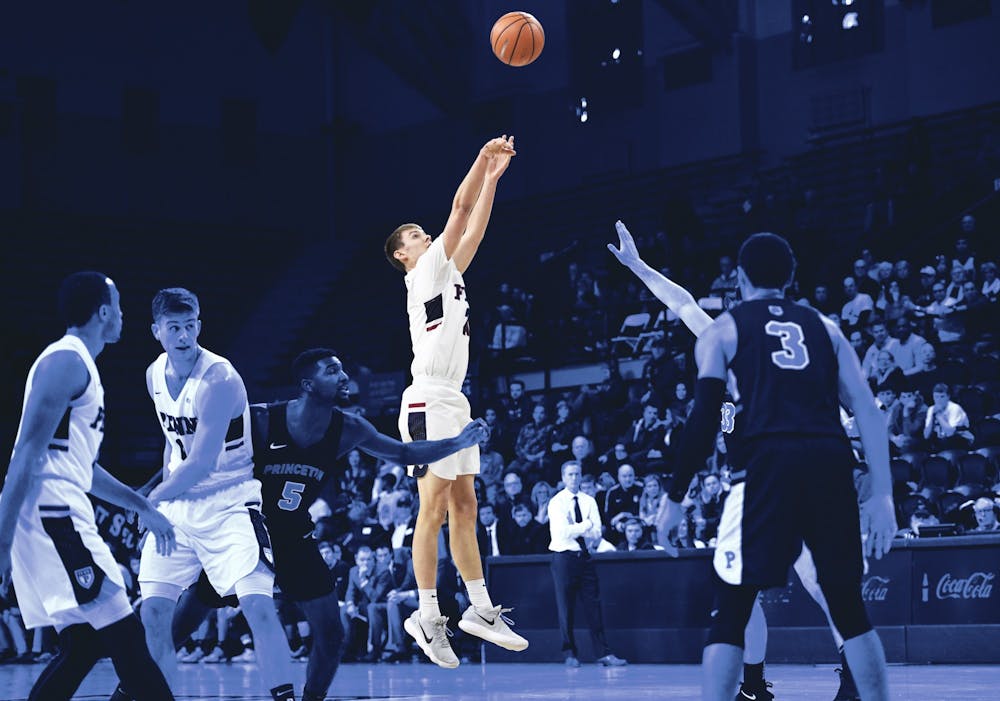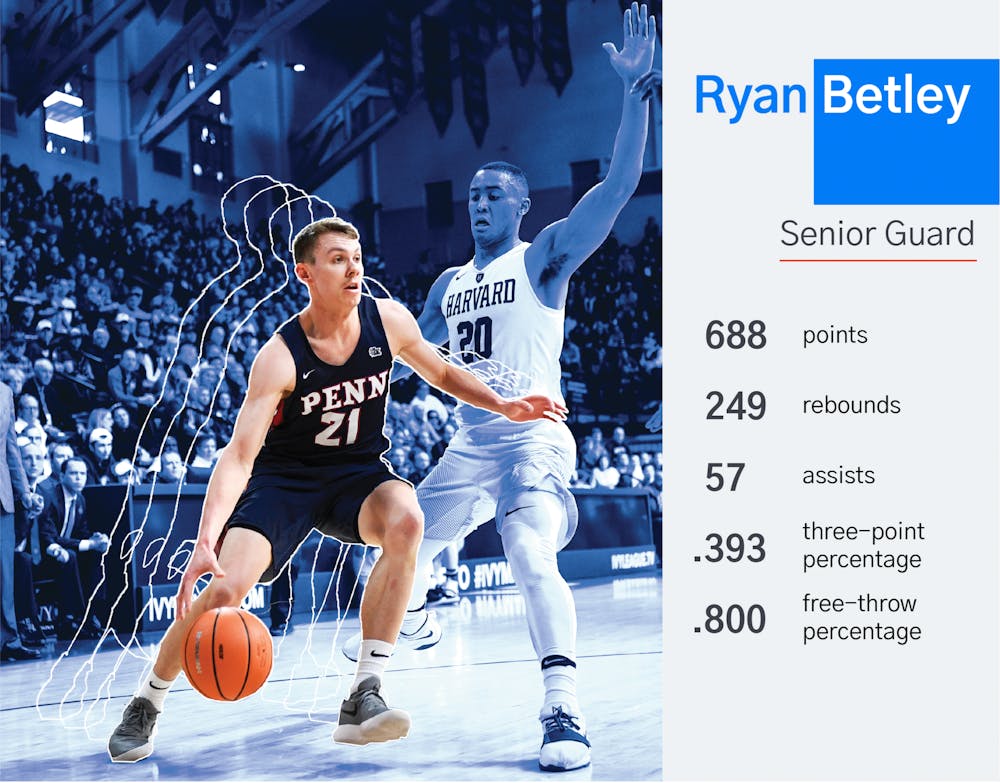
Penn men's basketball's senior guard Ryan Betley had already been limited in the 2018 preseason because of tendinitis in his knee before rupturing his patella tendon. Now back from injury, Betley feels as healthy as he has in a long time.
Credit: Chase SuttonWhen a star player returns from a devastating injury, coaches and teammates often throw out the old cliché that he’ll return “better than ever.”
In the case of senior shooting guard Ryan Betley, the cliché has a good chance of turning into a reality. What most people don’t realize is that even before he ruptured the patella tendon in his right knee, Penn men’s basketball’s leading scorer from two years ago was not at 100% health going into last season.
“After [his] sophomore year, we shut him down because of tendinitis,” coach Steve Donahue said. “He had not played that much even in the preseason last year.”
The full year off was not only an opportunity to rehab the injury to his right knee suffered in the George Mason game, but also a chance to address the tendinitis that plagued him in both knees. In a sense, it could have been a blessing in disguise.
“The knee feels great, better than it has in a while actually,” Betley said. “No tendinitis or anything like this. Both of my knees feel great.”
Still, it was a long road back getting to this point.
Betley’s rehab process was broken up into month by month stages. In the first month, his goal was to be able to bend his knee to a certain degree. Following that, monthly milestones included jogging, then running, then standstill shooting.
“Day by day I’d come to the gym and do my physical therapy, probably get an upper body lift in, and just work on staying in shape the best as I could because I couldn’t get up and down the floor,” Betley said. “It was just a lot of physical therapy and focus on the upper body lifting which is never bad."
Throughout the recovery process, the last thing Betley wanted to be reminded of was the fact that he was going through rehab in the first place.

“My least favorite part was when people would come up to me and say ‘I saw it happen, it looked awful.’” Betley said. “It was making me replay it in my mind. It’s something I don’t enjoy thinking about because of how traumatic it is at that moment.”
His teammates learned not to bring up the injury, but let him know they were there for him.
“All of my closer friends were just so great about not bringing it up. That definitely made it a lot easier,” Betley said.
Another factor that helped during his recovery was that he was not alone in the trainers room.
Junior guard Jelani Williams, who will miss his third consecutive year to injury, also had a similar timetable to Betley as he looked to recover from a second ACL tear suffered last summer.
“It was nice to have someone to talk to who was going through the same thing,” Betley said. “We could share how we felt about it. Just to talk about your recovery process and have someone to understand your perspective.”
When it comes to what Penn plans to do on the court, Betley’s scoring punch will be vital. A career 39% three-point shooter, his return should help boost an offense that struggled mightily at times last year.
In the Ivy League last season, Penn ranked No. 6 in field-goal percentage and three-point shooting percentage. With Betley on the court two seasons ago, Penn ranked No. 1 and No. 3 in both categories, respectively.
As the season wore on, Betley's absence was felt more and more. In four of the last five games of the season, including the Ivy League tournament semifinal loss to Harvard, the Quakers were not able to muster more than 65 points.
“It was obvious that we really ran out of gas on the offensive end with guys who can score,” Donahue said.
Though Penn struggled on offense at times throughout the 2018-2019 season, Betley’s injury did allow senior guard Devon Goodman to emerge as the top scoring option in the backcourt. Goodman averaged nearly 14 points per game, compared to four points per game over his first two years. Goodman and classmate AJ Brodeur carried most of the offensive burden for the Quakers, with Brodeur leading the team in points, assists, rebounds, and blocks.
Compared to expectations coming into last year, Betley will likely not be the clear cut number one scoring option. With Goodman catapulting into an all-league talent and Brodeur emerging as arguably the best all-around player in the Ivy League, some might assume it’ll be difficult to find shots for all three of the seniors. However, how Donahue sees it, the team simply needs more guys who can get buckets, and Betley returning will surely help with that. Donahue pointed toward Betley's versatility as an asset in a more top-heavy lineup.
“I think he is a stronger physical player as opposed to what we saw as a sophomore,” Donahue said. “He’s going to be able to finish better [around the basket.]”
As a sophomore, 55% of Betley’s field-goal attempts were from deep. Though some of that can be ascribed to Donahue’s system, Betley was the only starter who attempted a majority of his attempts from three-point range that year.

Sophomore guard Bryce Washington, who started in place of Betley, took 73% of his shots from three-point range last season. With both guards projected to start this season, it will be even more important for Betley this season to utilize a strong inside game around the rim.
Besides scoring, which was already his specialty, Donahue anticipates that he’ll be a better defender and rebounder as well.
However, where Betley thinks he made the biggest strides this offseason came in how he thinks about the game.
“I think I’m more mentally strong than I’ve ever been,” Betley said. “I considered myself mentally strong before but I just think the mental side of the game slowed down tremendously for me.”
“I think I’ll surprise some people, where I’ve come as a player. I watched more basketball when I was injured than I ever have in my life,” Betley said in an interview with the Philadelphia Inquirer last week.
Also in that article, Betley announced that this would be his last season in University City. After the season, the Philadelphia native will transfer as a graduate student, eligible to play immediately wherever he decides to take his talents.
“Coach Donahue made it very clear that whatever I thought was best for me was what he thought I should do. He just helped me think through if I wanted to stay, what I would have to do academic wise,” Betley said. “I just decided I didn’t want to go through with slowing my courses down, coming up with a five-year plan here. I just wanted to graduate on time. I didn’t have too many classes left. Just knowing that and [that] I could get a scholarship somewhere else for some free school [helped me make my decision].”
When the time comes, Betley projects to be quite sought after on the graduate transfer market.
“At this point in his career, as strong as he is, as good a player he is, he can help anybody, literally anybody, depending on what role he wants to play,” Donahue said. “A lot of people will take a 23 year old who’s been through what he’s been through and his ability, his shooting, and his understanding of the game coming from a winning program."

In terms of picking a specific school, Betley has not given it much thought, though NCAA tournament chances will be a big factor. Additionally, his fit into a team's scheme will play a bigger role in how he makes his decision compared to his decision to come to Penn out of high school.
“I wanted to go to Wharton and it’s the best business school,” Betley said of his decision to come to Penn. “I’ve put in my academic work for sure so I want to use the fifth year as a year to do something different.”
Though he did not reveal much in terms of what type of school he’ll play for next year, it is clear the basketball component of the decision will take on a greater onus once he enters the transfer portal.
But for now, where he’ll play next year is not his primary focus.
“The most important thing is I gotta stay healthy for a year. I just want to come out here and win an [another] Ivy League Championship at Penn and after that I’ll take care of the fifth year and things beyond that,” Betley said.
If Betley really does return “better than ever,” both his personal and team goals have a good chance of coming to fruition.
For more basketball preview coverage, check out the main page here.
The Daily Pennsylvanian is an independent, student-run newspaper. Please consider making a donation to support the coverage that shapes the University. Your generosity ensures a future of strong journalism at Penn.
Donate




